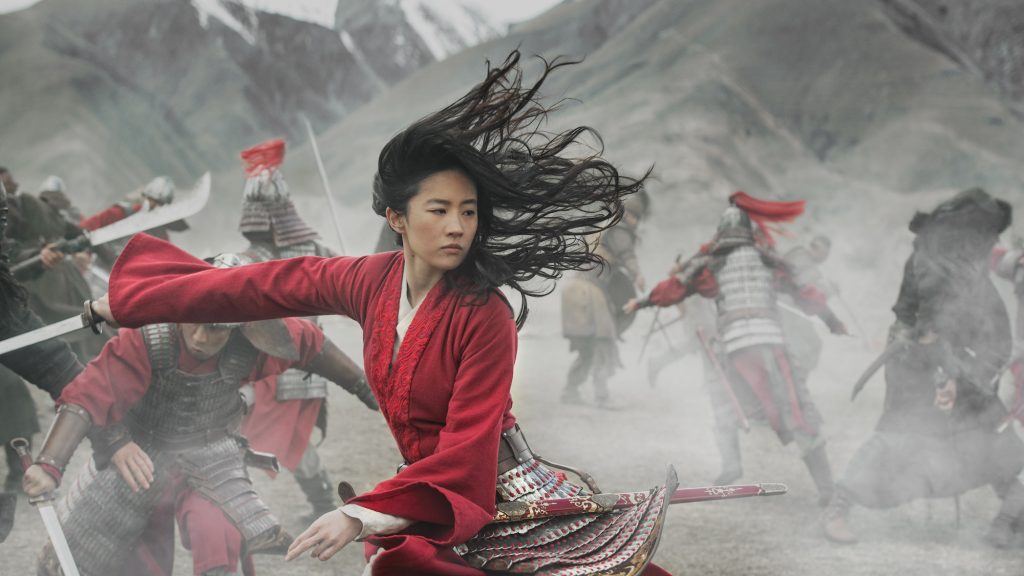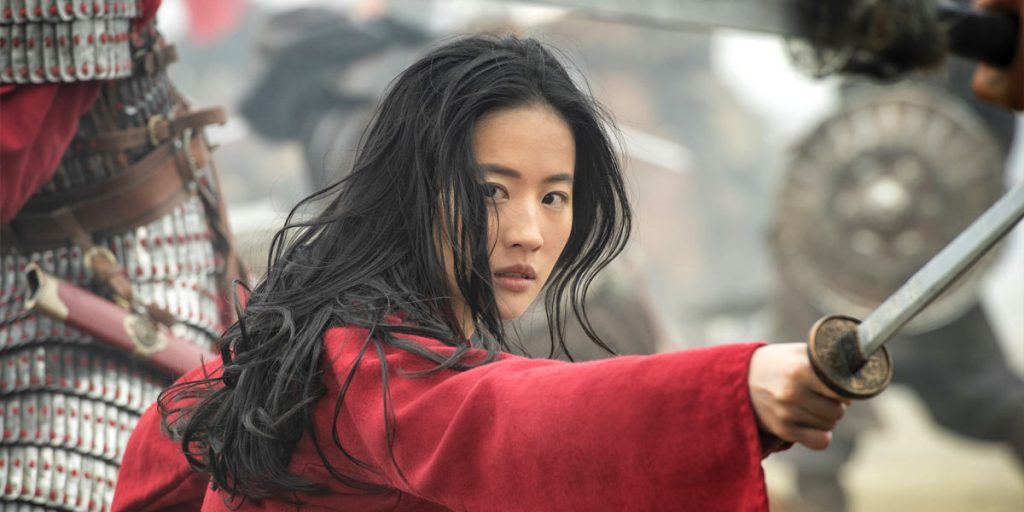Mulan (2020) is beautifully designed but undercut by poor editing and some strange storytelling decisions.
I have criticized nearly every Disney live action reboot for being little more than soulless cash grabs. Even the best of the lot (like Jon Favreau’s Jungle Book) do little to justify their existence as actual independent works of art. Mulan (2020), however, has been treated differently. Gone is the slavish devotion to past Disney triumphs, and in its place is a film that seems deeply committed to embracing some of the classic tropes of Chinese cinema. An all Asian cast, quite literally unprecedented in Western blockbuster filmmaking, sees New Zealand filmmaker Niki Caro (Whale Rider) attempt to adapt the mid-level Disney animated film for 2020’s audiences.
Aesthetically, Caro and her team have knocked it out of the park. Everything from the costumes to the set designs to the giant CGI enhanced sets are impressive. The color palette is bright and eye catching in a way so few recent blockbusters are – it is ironic that it is released in such close proximity to Tenet, as Christopher Nolan is perhaps more responsible for the staid gray color palette that infects modern blockbusters than anyone. There is a real feel of epic theatrical scope to Mulan that has unfairly been taken from it by COVID-19.
The story itself remains effective in broad strokes. When foreign invaders threaten the Chinese, the emperor decrees that each family much submit one man to the war effort. Mulan, seeing her elderly father’s enfeebled state, decides to disguise herself as a man and venture off to war. Inspired by a Chinese ballad, it is at heart a moving story of a daughter’s filial devotion. And Caro nails the big emotional beats of Mulan’s choice to take her father’s place and try to blend in as a man. And, while the film has purged the animated version’s dragon sidekick, love interest, songs, and much of its humor, I think the decision is an effective one. An epic heroic wuxia cinematic ballad is perhaps the most natural way I can think of to tell this story.

Here’s the main problem: for reasons the plot never makes clear, Mulan has superpowers in this movie. I don’t mean the run of the mill wuxia run on walls and jump great distances unharmed sort of powers, rather Mulan – and her nemesis Xianniang – are able to weaponize their “chi” in such a way that grants them even greater abilities. While Xianniang can turn into a hawk or a flock of small birds or mimic anyone she encounters ala Mystique, Mulan’s powers seem to boil down to greater acumen with weapons of war and even more preternatural balance and movement abilities. I cannot help but think it cheapens the character to see so much of her strength as little more than dynastic Chinese midichlorians.
There’s a fantastic cast here in support, but much of it is squandered. If you have Donnie Yen (Rogue One: A Star Wars Story, the Ip Man series) in your movie and you’re going to put a sword in his hand, you have an obligation to put the camera on him and leave it alone. He is a human special effect. Caro and her editor slice every fight scene into tiny little cuts – there is no grace left for the performers when each sword swing is accompanied by a cut. By the time she is done, Yen – perhaps modern cinema’s most graceful martial artist – has been reduced to little more than “some actor in a costume.” All of the film’s action sequences have the same issue: Caro simply does not have the patience to let her actors (or stuntmen) do their thing. The staccato editing serves to undercut so much of the grandeur the film’s still images might instill.
Jet Li appears here as the Chinese Emperor, but has been badly dubbed and is not granted any action sequences (despite a cruel tease to the contrary by the movie). Mulan’s military friends are likably played, and Yoson An in particular manages to elevate his scenes. Yifei Liu (The Assassins) draws the titular role. She is blessed with an extremely emotive face and a dancer’s physicality, but again Caro and editor David Coulson do her action sequences no favors. It seems apparent that she has comedic timing, but so much of it is quashed down under the role’s demand that she play an unemotive man. It is perhaps unfair to criticize Liu for it, but I’m willing to suspend my disbelief for a great many things in cinema, I was unable to believe that her fellow soldiers would buy her as a man for even a single second. If you permit me a light spoiler, a very brief late film cameo by a radiant Ming-Na Wen (the animated film’s Mulan) cannot help but beg the question of what she could have done with the role.
But I do want to take a minute on the film’s MVP: Tzi Ma. The film’s opening sequence sees a young Mulan chasing a chicken throughout her hometown. The scene is flat out bad. From editing to action to tone, Mulan gets off on the wrong foot. It’s Tzi Ma’s performance as Mulan’s father – an honorable man willing to serve his country again if needed – that gets the film back on course. Ma, perhaps best known as the father in The Farewell, has the same ability as Sterling K. Brown to generate empathy on demand. His face is so expressive, and his wells of emotion apparently so deep that he makes even the hoariest dialogue work. That the plot necessarily sidelines him for much of the film’s runtime, but he resonates in just a few minutes.
I truly appreciate what Mulan attempted to do: it’s an honorable effort to celebrate Asian cinema and tell a powerful feminist fable. Much of it is beautifully designed and it is well cast, but the technical failures and odd narrative choices keep Mulan from greatness.
Mulan (2020) is now available to watch on digital and on demand.

